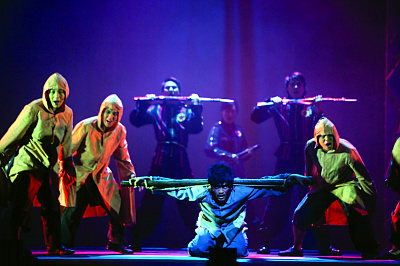
The executive director of the musical, Jung Sung-san was born in North Korea. He studied at the Pyongyang University of Movie Theater before being caught listening to a South Korean radio show by the National Security Agency of North Korea.
In 1994, Jung escaped to the South, while being escorted to the Yoduk concentration camp. The camp located in the town of Yoduk in Ham kyung Province, mainly holds political prisoners such as would-be North Korean defectors and political dissidents. Jung’s offence was merely “listening to South Korean radio,” he says.
Jung started writing the scenario for “Yoduk Story” as a movie in 2003, after hearing the news that his father had been publicly executed by the North. Jung’s father was put to death on the charge that his son, Jung, had been actively working in South Korea as a scriptwriter for films that “stimulated” the North.
In North Korea, family members and relatives are easily punished for the wrongdoings of another family member.
At the time, the South Korean government banned the production of any type of movie that addressed human rights issues in the North. This made it hard for Jung to receive any support for the film on versions of “Yoduk Story.”
But Jung never gave up, for he knew how serious problem human rights in North Korea was. Jung eventually came up with a musical instead of a film.
“I could not stay still even when the rest of the world did not care very much about the issue,” said Jung. “So, I risked my life, and what came out of it was the musical ‘Yoduk Story.’
The musical is a chronicle of a renowned North Korean dancer who is suddenly stripped of her glorious life and sent to the Yoduk concentration camp after her father is accuse of being a dissident.
Although the main character, Kang Ryun-hwa is a made up figure, Jung said, “The musical Yoduk Story is not a processed anecdote but is a real-life story of the things that actually happen in a concentration camp.”
When the musical first debuted in 2006, Jung visited Ewha with his musical to give a special lecture for Ewha students. On March 22, 2010, Jung visited Ewha once again to give another special lecture on North Korea’s current situation and the culture of unification.
The story of Yoduk paints a grave image of the deadly concentration camp in which the prisoners are treated more like animals than human beings. But, although the musical’s purpose is to show the reality of the Yoduk concentration camp, Jung says that there is a world of difference between the real Yoduk concentration camp and the musical.
“Those who have experienced the concentration camp say that the musical is superficial. On the other hand, South Korean audiences describe it in one expression: simply horrifying.”
Amid the gruesomeness, “Yoduk Story” gets across a message of love and forgiveness.
“Our future depends on how we perceive North Korea,” said Jung. “The North is no longer our dark and heavy past. It is our future blue ocean.”
“Our future depends on how we perceive North Korea,” said Jung. “The North is no longer our dark and heavy past. It is our future blue ocean.”
Jung added that the biggest crime in the world is ignorance. “We now have to escape being ignorant culprits,” he said. “I hope Ewha can stand in the forefront of this divine transition of values.”
“Yoduk Story” is now having a worldwide tour, starting in the United States and travelling to other foreign countries in the following months from May to December.
Jung said, “My ultimate goal is to unfold a universal campaign by gathering more prominent people around the world who want to help improve the human rights situation in the concentration camps.”

